With the election less than two weeks away there has been a great deal of speculation about the Latino community’s support for President Obama, particularly in Florida. Most recently, an Interactive Voice Response survey, or “robo-poll,” conducted on October 10-11 by Florida International University showed that 50.7% of Latinos in Florida who identified themselves as likely voters would vote for President Obama, with 44.2% supporting Governor Romney. With a margin of error of 3.65%, this puts the race at dead even in Florida.
These figures are probably not accurate for two reasons (hat-tip to Marc Caputo of the Miami Herald). One is that the FIU poll did not include cell phones. There is a growing consensus that omitting cell phones biases polling results in favor of the Republican Party. Latino Decisions surveys include cell phone only households in their samples.
Another issue is that the FIU figures do not accurately account for the political attitudes of Cuban Americans. For a variety of reasons, antipathy for leftist politics arguably at the top of the list, Cuban Americans are unique among Latinos because they are generally supportive of the Republican Party. For example, as seen in Figure 1, data collected by Latino Decisions from registered Latino voters in Florida on September 22-28 show that Cuban Americans are much more likely to identify as Republicans than Puerto Ricans, the second largest (and growing) group of Latinos in Florida. The margin of error in this poll was 4.9%. Both landline and cell phones were called. This same poll shows that 39% of Cuban Americans intend to vote for Obama (50% for Romney), compared to 71% of all other Latinos in the poll (22% for Romney). The issue here is that the FIU results were not “weighted” to account for the possibility that Cuban Americans—i.e., votes for Romney—were overrepresented in the poll relative to their actual share of Florida’s Latino electorate. The Latino Decisions data discussed above were corrected in this manner.
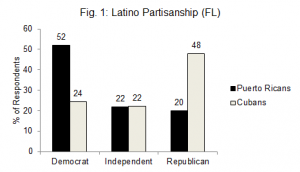
The upshot of all of this is that any softening of Latino support for Obama in Florida is, at the very least, overestimated. If we compare the results of the September Latino Decisions poll to one they conducted in June, support for President Obama among Latinos in Florida has been solid over the summer (Figure 2). Note that with a 4.9% margin of error the shifts in the data over time are not statistically significant, though perhaps indicative of a weak trend of increased support for the President.
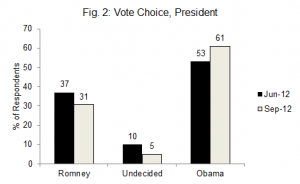
Part of why Obama is popular among Florida’s Latino electorate, Cuban Americans aside, is the issue of immigration. One might assume that this issue is not as salient among Florida’s Latinos because the state is relatively isolated from the heated immigration debate in the Southwestern United States. As a corollary, data from the September Latino Decisions poll show that Latinos in Florida are less likely to know an undocumented immigrant than Latinos in Nevada, another state they polled at the same time (Figure 3). This all said, when you directly ask how important immigration is to their vote, Latinos in Florida indicate that it is very important, equally among those who do and do not know an undocumented immigrant given the margin of error (Figure 4).
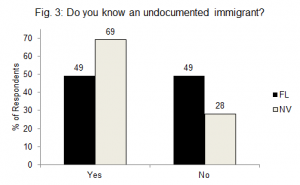
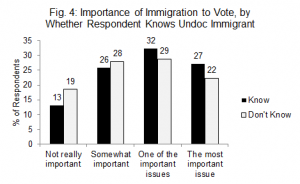
How will these attitudes on immigration policy play out in the polls? Data from Latino Decisions’ September poll show that respondents in Florida are much more enthused by Obama’s recent approach to immigration than Romney’s (Figure 5). The President’s shift in policy to stop deportation of undocumented immigrant youth seems to have yielded electoral dividends among Latinos in Florida, despite the fact that deportation rates (though not the raw total of deportees at this point in time) have been higher during his administration compared to George W. Bush’s.
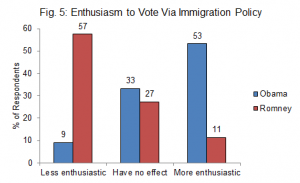
While Latinos in Florida support Obama, this support is meaningless if the community does not turn out to vote. One issue here is the voter registration roll “purge” of suspected non-citizens from the voting rolls currently going on in Florida. This process has overwhelmingly targeted Democrats and Latinos. Before the September Latino Decisions data were collected, I hypothesized that this might create concern among Latinos in Florida, perhaps to the point of suppressing turnout. The poll asked respondents whether they were concerned that legal voters would be purged from Florida’s registration rolls. Figure 6 shows that concern is high among the Latino community. This fear aside, however, Figure 7 shows that enthusiasm to vote is very high among Latino registered voters. Figure 8 shows that enthusiasm is even higher today than it was in the historic 2008 election (I didn’t think this could be the case, so I checked these numbers too many times than I can count).
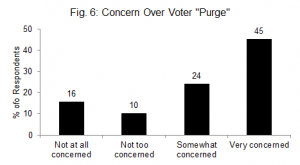
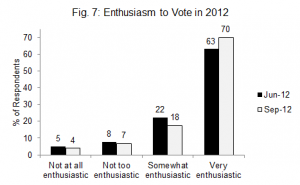
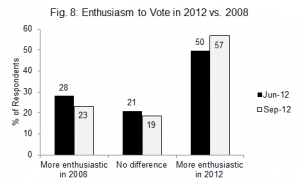
All told, barring any wild change in the political landscape, the President will win the majority of Latino votes in the State of Florida and turnout should be high. What remains to be seen is whether this will be enough to secure him Florida’s 29 electoral votes.
Casey A. Klofstad is an associate professor of political science at the University of Miami, Coral Gables, FL. He has a forthcoming article co-authored with Benjamin G. Bishin in Political Research Quarterly entitled, “The Political Incorporation of Cuban Americans: Why Won’t Little Havana Turn Blue?”. His book, Civic Talk: Peers Politics and the Future of Democracy, is now available in paperback. You can follow him on Twitter at @klofstad, and on Facebook at www.facebook.com/klofstad
The commentary of this article reflects the views of the author and do not necessarily reflect the views of Latino Decisions. Latino Decisions and Pacific Market Research, LLC make no representations about the accuracy of the content of the article.


